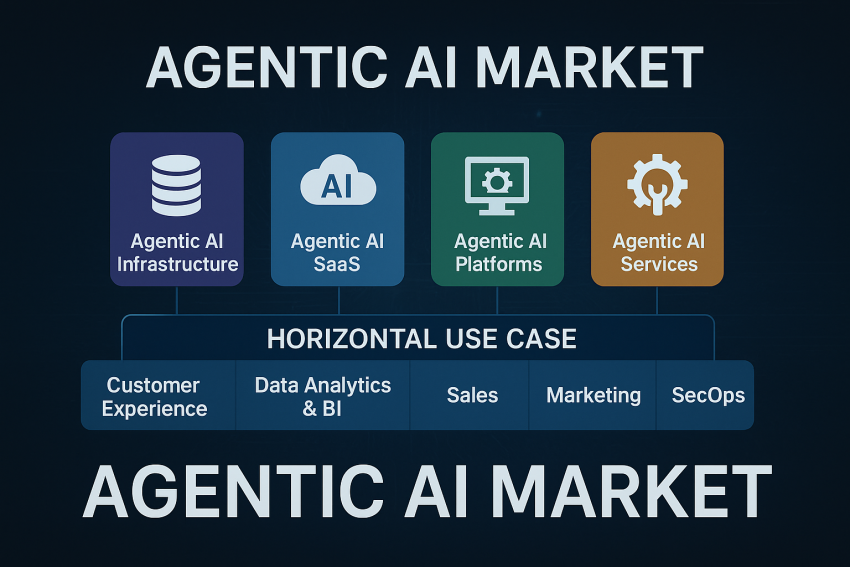According to MarketsandMarkets™, the report for Agentic AI Market is slated to expand from USD 7.06 billion in 2025 to USD 93.20 billion by 2032, at a substantial CAGR of 44.6% during the forecast period. This unprecedented growth underscores a paradigm shift from static automation to autonomous, context-aware systems capable of reasoning and acting with minimal human oversight.
Key Market Trends and Innovations
- Shift from automation to autonomy: Enterprises are embracing intelligent agents that can plan, reason, and act independently reducing human intervention in complex, multi-domain workflows.
- Rise of agentic AI infrastructure: Cloud-native orchestration layers, model-hosting frameworks, and control interfaces form the foundation for scalable, enterprise-grade deployments.
- AI orchestration platforms take center stage: Solutions such as Microsoft’s Copilot stack, NVIDIA’s Blueprints, and Google’s Agentspace exemplify the trend toward integrated orchestration and lifecycle observability.
- Embedded intelligence in enterprise software: Hyperscalers and enterprise vendors are launching agent-first architectures, embedding AI directly into operational workflows.
- Focus on governance and compliance: As agents gain autonomy, enterprise-grade frameworks now emphasize transparency, traceability, and real-time control.
- Convergence of LLMs and contextual memory: Enhanced reasoning capabilities through integration of large language models with memory and knowledge systems are enabling richer, more adaptive decision-making.
Download PDF Sample: https://www.marketsandmarkets.com/pdfdownloadNew.asp?id=208190735
Fastest-Growing Application: Workplace Experience
- Explosive adoption of digital assistants: AI agents are now integrated into productivity tools—email clients, meeting platforms, and workflow systems—to autonomously summarize, schedule, and respond.
- Context-aware productivity: The convergence of LLMs, scheduling logic, and knowledge repositories allows workplace agents to act proactively, not just reactively.
- Support for hybrid and async work models: Enterprises are using AI to bridge time zones and improve task continuity in distributed teams.
- Embedded intelligence across roles: Modular assistants tailored for HR, sales, engineering, and project management enhance responsiveness and collaboration.
- Vendor momentum: Players like Microsoft, Google, Zoom, and Notion are natively embedding workplace agents—accelerating deployment and adoption.
Regional Insights
- North America leads the global market (2025):
- Strong enterprise AI maturity and robust digital transformation initiatives.
- Heavy investment from Microsoft, AWS, Google, ServiceNow, and Salesforce.
- Early adoption across BFSI, healthcare, technology, and professional services.
- Government-backed AI innovation and pilot projects for autonomous systems.
- Dense ecosystem of startups, academic research, and regulatory clarity fuels leadership.
- Emerging adoption in APAC and Europe:
- Accelerated deployments in India, Japan, and EU nations as AI regulations stabilize.
- Focus on cost optimization, compliance, and intelligent process automation.
Future Outlook
- Agentic AI becomes a strategic differentiator: Enterprises will leverage autonomous agents to drive decision velocity, process autonomy, and workforce augmentation.
- Integration into core business pipelines: Agent-first architectures will redefine enterprise platforms across industries.
- Governance-driven AI ecosystems: Expect enhanced frameworks for security, ethics, and performance monitoring.
- Multi-agent collaboration: Future deployments will emphasize agents working cooperatively across departments and business units.
- Sustained hyperscaler investment: Continuous innovation from Microsoft, NVIDIA, Google, and AWS will cement infrastructure maturity.
Competitive Landscape: Key Players
- Aisera (US)
- Avanade (US)
- PwC (UK)
- Wipro (India)
- HCLTech (India)
- Cognizant (US)
- Cisco (US)
- Ericsson (Sweden)
- NTTData (Japan)
- SAS (US)
The Agentic AI revolution is reshaping enterprise intelligence from automated workflows to autonomous ecosystems. As organizations embed reasoning, context-awareness, and real-time adaptability into digital operations, Agentic AI is poised to become the cornerstone of next-generation enterprise transformation.

